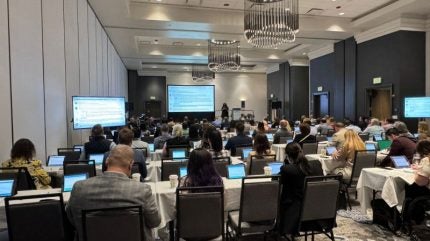
While the decentralisation of clinical trials has been happening for a while, many in the industry are still not moving with the tide according to MindMed executive director Lysa Triantafillou.
Speaking at the 13th Annual Outsourcing in Clinical Trials Southeast 2024 conference in North Carolina, the biotech leader called for professionals in the life science industry to “embrace” the trend of DCTs but ensure that they understand how to utilise technology to reach intended patients and participants in a compliant, ethical, and professional manner.

Discover B2B Marketing That Performs
Combine business intelligence and editorial excellence to reach engaged professionals across 36 leading media platforms.
Addressing delegates during a presentation on the future of clinical trials, Triantafillou highlighted how the US Food & Drug Administration (FDA) and other global regulatory agencies are embracing DCTs, as evidenced by recent guidance that refer to DCT, tele-health, digital medicine, and real-world data.
“There is an understanding by regulators that DCTs can link to diversity initiatives,” explained Triantafillou. “DCTs have the potential to expand access to more diverse patient populations and enhance representation of these populations in clinical trials so the data generated during trials reflects the racial and ethnic diversity of the population expected to use the medical product if approved.”
Other benefits of DCTs are being widely recognised she added, including faster clinical study execution compared to traditional trial models. If companies can bring research closer to patients’ homes or local settings it also significantly reduces the burden of participation in trials.
“Adapting to DCTs is increasing trial access for patients who may have difficulty traveling to traditional trial sites and overall improving the patient experience,” Triantafillou noted.

US Tariffs are shifting - will you react or anticipate?
Don’t let policy changes catch you off guard. Stay proactive with real-time data and expert analysis.
By GlobalDataTechnology – “not the only answer“
However, despite the benefits of a decentralised approach, industry professionals were warned of the potential impacts to quality and compliance.
“Utilizing multiple vendors and technologies during DCTs can create a complicated delegation and oversight model,” explained Triantafillou. “Less standardization and complicated delegation and oversight models often result in lower quality such as more errors, later detection, lack of oversight and accountability.”
She highlighted how while DCT technologies are increasingly being utilized in clinical trial research, it is equally important for developers to recognize when technology isn’t the solution.
“Implementing technologies can cause exclusion of certain participants or research centers or create start-up delays/bottlenecks,” said Triantafillou.
“Collecting accurate and reliable data remotely during trials is also another challenge for companies conducting DCTs. Overall, ensuring data integrity, standardization, and compliance with regulatory requirements can be more complex when data is collected from various sources and devices outside of a controlled clinical setting.”
According to Triantafillou, standardization across sites is needed and companies should also be wary of ‘system bloat’. “Understand that technology is not always the answer,” she said.
The MindMed executive’s sentiments were echoed by other speakers at the OCT Southeast 2024 conference. During a session on DCT strategy, Scott Palmese, Executive Director of Decentralized Clinical Trials at Worldwide Clinical Trials reminded companies that there is no “one size fits all” approach to adopting DCTs.
“Think of DCTs as a category of tools in your toolbox alongside other site and patient-focused tactics,” said Palmese. “Then discuss these solutions with sites and use those site relationships to understand what systems sites use and how your proposed technologies or strategies could integrate.”
GlobalData’s Clinical Trials database shows that the use of virtual components has drastically increased over the last ten years. Trials utilising virtual components peaked in 2021 following the Covid-19 pandemic, but 2022 and 2023 saw figures remain higher than in pre-pandemic years, indicating that these approaches are here to stay.
The 14th Annual Outsourcing in Clinical Trials Southeast 2025 conference will be held in Embassy Suites by Hilton, Durham/Raleigh Research Triangle, NC, USA from 1-2 April 2025.





